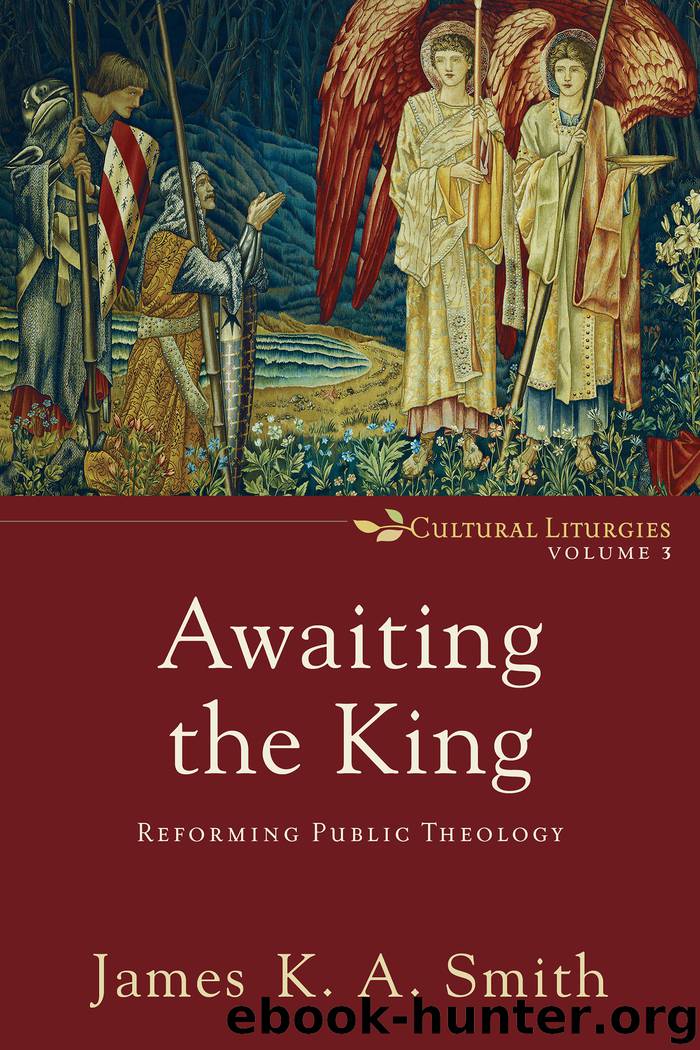Awaiting the King--Reforming Public Theology by James K. A. Smith

Author:James K. A. Smith
Language: eng
Format: epub
Tags: Theology/Culture;Christianity and politics;Public theology;Political theology;REL067000;REL051000;REL084000
ISBN: 9781493406609
Publisher: Baker Publishing Group
Published: 2017-09-12T04:00:00+00:00
Excursus: Common Grace versus Providence
The upshot of this analysis and genealogy is to encourage a posture of critical, selective affirmation regarding Christian participation in the liberal state, even if we must also be wary of how the institutions of late modern liberalism can sometimes deform us. Given the Christian legacy of liberalism, Christians stepping into a liberal public square should have a vague sense of familiarity, like someone walking into a long-lost cousin’s home and seeing family photos that are familiar, family routines that were your own, and smelling meals emanating from the kitchen that remind you of home. While the politics of the liberal state is still earthly city politics, it is nonetheless a configuration of the earthly city that bears the marks of an encounter with the gospel in deep and significant ways. It is not wholly other to the politics of the ekklēsia; to the contrary, it might be more like the church-as-polis than we realize. Which is precisely why, with careful discernment, we can cautiously affirm and selectively participate in some of its institutions and rhythms, even if we also labor and hope for its continued “conversion”—which, given the dynamics of late modern liberalism, would be akin to the prodigal returning home. To anathematize “liberalism” per se is to write off the prodigal. Furthermore, such simplistic, almost Manichaean assertions of antithesis are plagued by an idealism that fails to recognize differences between political regimes, effectively forgoing the ability to evaluate specific habits, practices, policies, and institutions. It is a kind of idealism whose judgment is obfuscated precisely because it is unable to make differences and distinctions. As Hegel put it, such idealisms operate in the darkness of a night in which all cows are black.59 In contrast, we have argued for a posture of evangelical judgment that makes it possible to both evaluate and engage in the less-than-ideal realities of political regimes like liberal democracy.
But note the way we have underwritten this kind of selective, intentional participation in liberal democracy: it is through a genealogy of the contingent history of the West (and now the world) and the effects of a temporal encounter not merely with “natural law” but with the specificity of the gospel and the lived realities of the church as a community that embodies an alternative politics. In other words, what O’Donovan, Leithart, Farrow, and others point to is not a vaguely “natural” set of principles that govern political life in liberal democracy but rather the specific, determinate effects of what O’Donovan would call “evangelical” politics—a politics shaped by the christological distinctiveness of the gospel and the incarnational specificity of the body of Christ.
This is quite different from typical Reformed ways of licensing Christian participation in the public sphere. Particularly in the Kuyperian tradition, political participation is encouraged by means of an appeal to “common grace,” an operation whereby God, in a fallen world, nonetheless extends a “preserving” (vs. “saving”) grace that restrains sin, sustains creational laws and institutions, and creates a “commonness” despite the ultimate distinction between the elect and the damned.
Download
This site does not store any files on its server. We only index and link to content provided by other sites. Please contact the content providers to delete copyright contents if any and email us, we'll remove relevant links or contents immediately.
| Africa | Americas |
| Arctic & Antarctica | Asia |
| Australia & Oceania | Europe |
| Middle East | Russia |
| United States | World |
| Ancient Civilizations | Military |
| Historical Study & Educational Resources |
Cecilia; Or, Memoirs of an Heiress — Volume 1 by Fanny Burney(32527)
Cecilia; Or, Memoirs of an Heiress — Volume 2 by Fanny Burney(31928)
Cecilia; Or, Memoirs of an Heiress — Volume 3 by Fanny Burney(31916)
The Secret History by Donna Tartt(19003)
Sapiens: A Brief History of Humankind by Yuval Noah Harari(14346)
Leonardo da Vinci by Walter Isaacson(13292)
The Radium Girls by Kate Moore(12003)
Sapiens by Yuval Noah Harari(5346)
How Democracies Die by Steven Levitsky & Daniel Ziblatt(5200)
The Wind in My Hair by Masih Alinejad(5071)
Homo Deus: A Brief History of Tomorrow by Yuval Noah Harari(4890)
Endurance: Shackleton's Incredible Voyage by Alfred Lansing(4743)
Man's Search for Meaning by Viktor Frankl(4556)
The Silk Roads by Peter Frankopan(4513)
Millionaire: The Philanderer, Gambler, and Duelist Who Invented Modern Finance by Janet Gleeson(4448)
The Rape of Nanking by Iris Chang(4190)
Joan of Arc by Mary Gordon(4081)
The Motorcycle Diaries by Ernesto Che Guevara(4071)
Stalin by Stephen Kotkin(3942)
